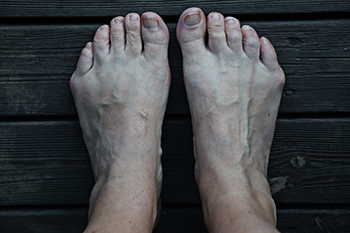
A bunionette, or tailor’s bunion, is a bony growth on the pinky toe classified as a deformity. It is the pinky counterpart of the more c,ommon bunion that forms on the big toe joint. When a bunionette and a bunion occur together, it is referred to as having a splayfoot. These growths are thought to develop from wearing narrow, tight shoes. However, some people may be genetically predisposed to bunions, due to an abnormality or enlargement of the toe ligament. Bunionettes can be visible to the eyes, swollen, and tender when palpated. If pain from a bunionette is not relieved with conservative treatments like wearing wider shoes or using orthotics, surgery may be necessary. If you have bunion problems and are experiencing discomfort, contact a podiatrist who can suggest the proper course of action for you.
If you are suffering from bunions, contact Dr. Yeon A. Shim of Roselle Podiatry Group. Our doctor can provide the care you need to keep you pain-free and on your feet.
What Is a Bunion?
A bunion is formed of swollen tissue or an enlargement of boney growth, usually located at the base joint of the toe that connects to the foot. The swelling occurs due to the bones in the big toe shifting inward, which impacts the other toes of the foot. This causes the area around the base of the big toe to become inflamed and painful.
Why Do Bunions Form?
Genetics – Susceptibility to bunions are often hereditary
Stress on the feet – Poorly fitted and uncomfortable footwear that places stress on feet, such as heels, can worsen existing bunions
How Are Bunions Diagnosed?
Doctors often perform two tests – blood tests and x-rays – when trying to diagnose bunions, especially in the early stages of development. Blood tests help determine if the foot pain is being caused by something else, such as arthritis, while x-rays provide a clear picture of your bone structure to your doctor.
How Are Bunions Treated?
- Refrain from wearing heels or similar shoes that cause discomfort
- Select wider shoes that can provide more comfort and reduce pain
- Anti-inflammatory and pain management drugs
- Orthotics or foot inserts
- Surgery
If you have any questions, please feel free to contact our office located in Roselle, NJ . We offer the newest diagnostic and treatment technologies for all your foot care needs.
